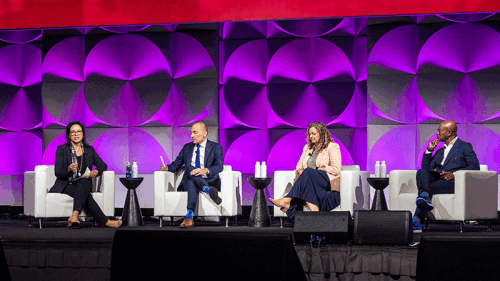Find out more about applying to the Hines Competition here.
“Knot Charleston,” the development plan that earned top honors in this year’s ULI Hines Student Competition for the Americas region, was the product of extensive research, thoughtful design, and close collaboration among the winning team of five Harvard University graduate students.
But what really made the difference, according to team leader Youngsoo Yang, was their visit to the competition site in North Charleston, South Carolina. “It’s one thing to read through a 28-page competition brief and do a bunch of research on Google Earth and maps and plans,” he says. “But being there in person really changed how we wanted to approach the site.”
The team formed after friends of Yang’s competed and were named finalists in the 2022 ULI Hines Student Competition. “I saw their work and was blown away by the body of work they produced, and that really got me interested in this competition,” he says.
Yang recruited four fellow students—Tomas Quaglia, Ben Parker, Emily Johansen, and Rachaya Wattanasirichaigoon—to enter this year. They brought experience ranging from architecture and landscape to urban planning and finance, including affordable housing development. This collaborative, cross-disciplinary approach was central to their success.
Resilience, Economy, and Community
In crafting their initial proposal for a mixed-use, mixed-income downtown area in North Charleston, they relied on the competition brief and their own research to understand the history, challenges, goals, and needs of the city and its residents. After being selected from 84 teams as one of four finalists, the team had the opportunity to see the site in person before finalizing and presenting their development plan.
“We thought in order for the proposal to be really successful, every one of us had to experience the site and share what we thought,” Yang says. “Our proposal really focused on three key things—resilience, economy, and community—and I think those three things [were] actually a direct response to the site itself.”
The team’s proposal—a mixed-use project dubbed “The Knot”—combines these values “with the city’s unique context to create a well-connected, affordable, and enriching place to live for generations.” For instance, they proposed a riverwalk along the Cooper River both as a public space for recreation and dining and as resilience infrastructure to protect against potential climate risks.
Their plan envisioned a “Maker’s Wharf” with space for manufacturing, a seafood market, and other economic activity. And the team addressed the city’s housing challenges by including new affordable housing close to schools, healthcare facilities, and more.
The hands-on, real-world exercise in urban planning and design gave the team a new perspective on how land use decisions affect how people live, work, and play in cities. “I’m very interested in climate change and the impact it has on our urban environments,” Yang says. “I think as developers, architects, urban planners, designers, we have really strong agency to have a big part of shaping how that goes.”
Before pursuing his master of urban design degree, Yang worked for more than four years as an architect. Now he hopes to shape the built environment from the development side, with an emphasis on creating sustainable and healthy communities. Yang completed his degree a week after attending the 2023 ULI Spring Meeting in Toronto, where he presented his team’s winning proposal. His experience in the ULI Hines Student Competition only sharpened his focus on the future.
“This was probably one of the best—if not the best—work team projects I’ve been on, mainly because of the people on the team,” he says. “It was a truly great learning experience, and I’m glad I did this because I feel like—for me—this is only the beginning.”


